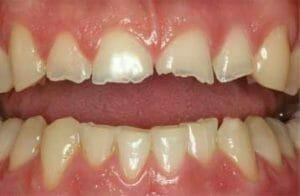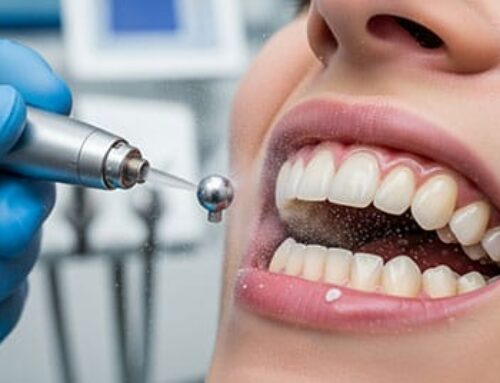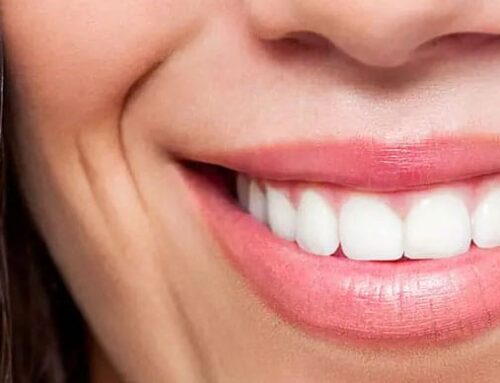Enamel is the outer layer of a tooth. It protects teeth from germs. As we age, our teeth may wear down and chip. You can take some simple steps to help slow this process and maintain a healthy mouth.
Limit Eating Sugary Foods and Drinks
First, reduce your consumption of sugary drinks and foods. They create the acid that weakens your teeth and wears down the enamel. You should also stay away from chewing candies since they harm the enamel. If you need soda, choose low-sugar soft drinks without artificial sweeteners. Sadly, they are still acidic and can wear down the enamel. We suggest drinking water instead. Eating healthy is vital for keeping your teeth strong. The food you choose is essential for fixing cavity issues.
Eating Foods That Counter Acids
Eat foods that have a lot of calcium. These foods help fight acids in the mouth and slow down how quickly teeth decay. Calcium keeps both teeth and bones strong. Choose foods like cheese, milk, and other dairy products. They guard and strengthen the enamel.

Don’t Overbrush Your Teeth.
When you brush your teeth too much, you wear away the enamel. Brush your teeth at a 45-degree angle to your gums. Make sure to move the brush back and forth. After eating sweets or citrus fruits, wait for about an hour before brushing your teeth. Acidic or sugary foods can soften the enamel, and brushing too much can harm your teeth.
Use Fluoride
Fluoride is a substance that helps stop cavities. It keeps teeth strong and helps them fight the acid made by bacteria after eating. Use fluoride toothpaste to make your enamel stronger and fix a decayed tooth. If you can’t brush your teeth, rinse your mouth with fluoride mouthwash after a meal.
 Treat Eating Disorders and Heartburn
Treat Eating Disorders and Heartburn
Heartburn happens when there is too much acid in the stomach. This acid can move up to your mouth and harm your enamel. That makes your teeth less strong. Eating problems like bulimia can also harm the enamel on your teeth. Food that you digest has acid. If you throw up because of an eating problem, that acid can weaken your enamel. It is beneficial to see a doctor to help feel better if you are experiencing heartburn or have an eating disorder — your teeth will thank you.
Avoid Pools That Are Not Chlorinated
Chlorine added to swimming pools helps lower the acid level in the water. If the pool is not chlorinated, the water could harm your enamel. Keep your mouth closed while swimming. Ask the pool attendant about the chlorine levels in the pool water.
Avoid Dry Mouth
A dry mouth can let bacteria make acid that harms your teeth after you chew. Saliva helps protect your teeth from these bacteria and cleans leftover food from your mouth. If you often have a dry mouth, you should see a dentist and discuss your problem.
 Stop Grinding Your Teeth
Stop Grinding Your Teeth
Grinding your teeth can damage the enamel. If you practice this habit, you should speak to your dentist. He might suggest a mouthguard. A mouthguard will protect your teeth and make it harder to grind your teeth.
Get Regular Checkups
You should visit your dentist every six months for teeth cleaning and a general dental check-up. These visits are essential. The dentist can look at your teeth and resolve a problem before it worsens. If your drinking water does not have fluoride, ask your dentist to suggest a mouthwash with fluoride.
Eat Remineralization Diets and Supplementation
Diets and supplements can fix cavity problems. Remineralization is a natural process that helps keep teeth strong and healthy. This process needs the right nutrition to work well. Some of the suggested supplements you should take include:
- Calcium—calcium leads to healthy bones and healthy teeth. Calcium is a building block for our bones. It is the main component of remineralization.
- Vitamin D3 is one of the most critical nutrients and crucial in remineralization.
- Vitamin K2 pairs with vitamin D3 to strengthen the body’s calcium absorption.
- Vitamin K2 activates osteocalcin. Osteocalcin is a protein that aids in tooth growth and repair. It plays a role in the dentin matrix and helps remineralize teeth.


 Treat Eating Disorders and Heartburn
Treat Eating Disorders and Heartburn Stop Grinding Your Teeth
Stop Grinding Your Teeth

